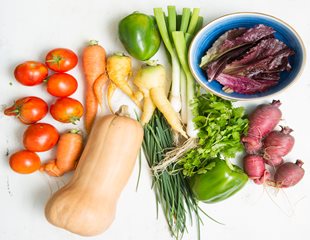Food is powerful. It impacts how we feel, our energy levels, our happiness and our overall health. For adolescents, or those between childhood and adulthood, what they consume is even more impactful, gaining at least 40 percent of their adult weight and 15 percent of their adult height during this period from ages 10-24. Registered Dietitian, Olivia Wagner (MS, RDN, LDN, IFNCP) explains the power of food and school lunches’ roles in adolescent performance.

Why Adolescents’ Food Choices are so Impactful
Puberty is accompanied by a growth spurt that increases the requirements for both macronutrients (proteins, fats, and carbohydrates) and micronutrients (vitamins and minerals). Protein as a macronutrient plays a special role here in structural development, rather than energy use, through puberty. Furthermore, adolescence is a time of transition when habits are formed that persist into adult life. Good habits, such as exercise and a healthy diet, are likely to bring many benefits, including improved performance in school.
Studies also suggest that adolescents are becoming more independent in their food choices, more likely to be influenced by their peers, and less likely to pick healthy foods. Yet, this adolescent stage is where the majority of cognitive and physical growth is occurring, all depending on the micronutrients and vitamins consumed. Certain vitamins and minerals, like Vitamin B12, folate, and thiamine, are important for brain development and memory. Others, like iron, affect cognition, memory and development and some, like zinc, impact attention, learning and memory.

Other Factors of Youth Health
Even though these vitamins and minerals are crucial, adolescent nutrition is not simply defined by the food young people consume. Rather, it also incorporates sociodemographic, behavioral, and environmental factors. Sociodemographic factors include socioeconomic status, age, sex, and location. Behavioral factors include patterns of beverage intake, portion sizes, dieting, family dinners, eating in front of and viewing television, and skipping meals (especially breakfast). Environmental factors include eating or buying food prepared outside the home, maternal education and employment, and parental diet. All these factors work in tandem to affect the overall nutrition of an individual. A few other factors can affect a person's overall nutrition such as the kinds of foods available at home, the amount of time to make food and the ability to purchase snacks. In order to mitigate harmful effects, planning ahead of time can help make sure meals are nutritionally balanced.
Simple Tip: Try having already washed, portioned-out produce or healthy snack cups for kids to grab anytime of the day, like these Nut Butter Snack Packs.
The Correlation Between Produce Consumption and School Performance
Around the world, studies show how meals impact school performance. A study of adolescents in South Korea showed that frequent intakes of breakfast, fruits, vegetables, and milk were related to high levels of school performance. In contrast, soft drinks, instant noodles, fast food, and candy were negatively associated with school performance. In Canada, junior high-schoolers reporting milk, vegetable and fruit consumption on a regular basis had better school-grades. The same results occurred in Norway, even independent of nutritional status and parental education. Therefore, unsurprisingly, the daily intake of sugar-sweetened drinks is inversely correlated with adolescents’ school grades.
Individuals, especially adolescents, should consume a diet that meets the requirements of micro and macronutrients needed to support healthy growth and development. When planning meals, try to include nutrient-dense foods and always try to include some fresh produce. As for snacks, set your kids up for scholastic success with real, whole food ingredients that’ll keep them energized and eager to learn.